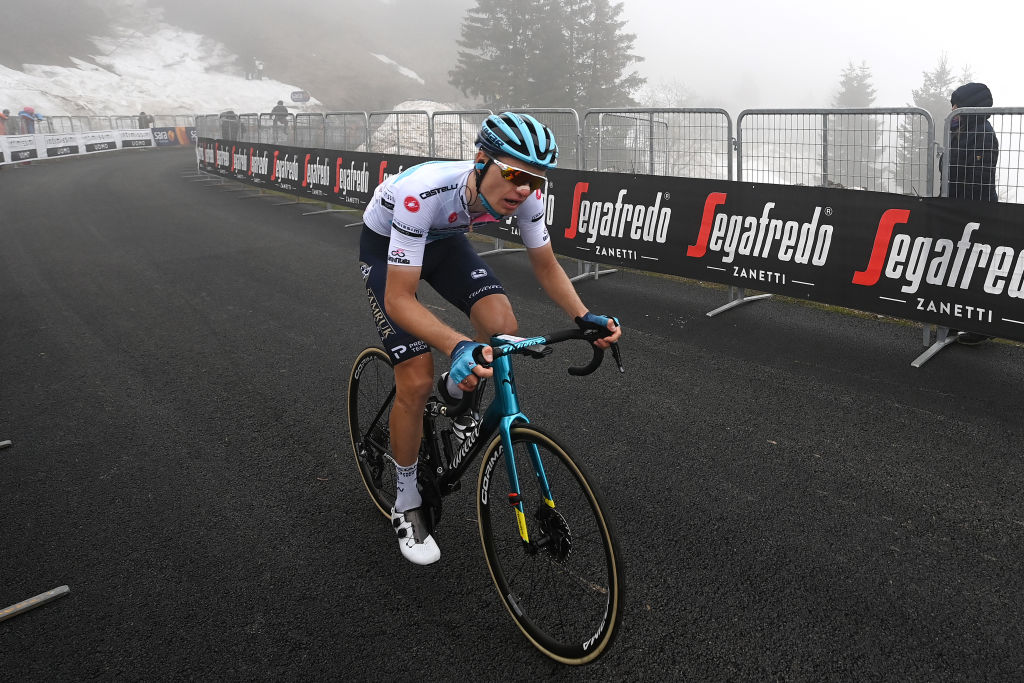Giro d'Italia: Vlasov loses ground as Astana ambush peters out
'Maybe I went a bit too deep in the final kilometre' says Russian

The Forcella di Monte Rest is an evocative place in Giro d’Italia lore, and Saturday marked the first time the race had descended its northern side since 1987. On that occasion, Stephen Roche slipped clear of his Carrera teammate and pink jersey Roberto Visentini to turn the event on its head and spark one of the Giro’s most enduring polemics.
The rights and wrongs of that tumultuous stage – was it a betrayal or just business? – will be open to debate for as long as riders are still contesting a pink jersey in the month of May. But it is indisputable that the sinuous descent in the Carnic Alps offers fertile terrain for an ambush.
Astana-Premier Tech directeur sportif Giuseppe Martinelli joined Carrera’s staff the year after that controversial Giro, having been a contemporary of his fellow Bresciano Visentini in the Italian gruppo in the early 1980s.
Perhaps it was inevitable that he would be alive to the possibilities offered by the descent of the Monte Rest when the Giro returned on stage 14, particularly when all attention was focused on the final haul up the Zoncolan.
Martinelli’s riders duly split the peloton on the descent, where Aleksandr Vlasov was piloted by teammates Luis León Sánchez, Harold Tejada and Gorka Izagirre, and maglia rosa Egan Bernal (Ineos Grenadiers) and was the only other GC contender to make the small front group. With a long valley ahead of the final climb to the Zoncolan, however, there was never any realistic chance that the move would stay away, and it soon petered out, though Astana continued to set the tempo in the peloton for some time afterwards.
Worse was to follow for Vlasov and Astana as the race hit the Zoncolan and, specifically, the steepest slopes and swirling mist of the final 3 kilometres. The Russian was unable to follow when Simon Yates (Team BikeExchange) and Bernal forced their way clear as the gradient reached its maximum extent, and he would concede over a minute in the tough final kilometre.
Vlasov crossed the line 16th on the stage, 2:55 down on winner Lorenzo Fortunato (Eolo-Kometa) and 1:12 behind Bernal. In the overall standings, he slips from second to 4th, and he is now 1:57 off the pink jersey.
Get The Leadout Newsletter
The latest race content, interviews, features, reviews and expert buying guides, direct to your inbox!
“In the end, I don’t know what happened, but I didn’t have the legs,” Vlasov said afterwards. “The team was good and we tried, but it went the way it went.”
For the opening two weeks, Astana have been largely content to allow Ineos dictate the terms of engagement on this Giro, though Martinelli and his protégé Vlasov had repeatedly suggested that the race would take on a new guise on its third weekend. They succeeded in briefly isolating Bernal on the descent of the Monte Rest, where he had only Jonathan Castroviejo for company, but they were unable to cause lasting disruption.
“It was worth trying something. You never get anything if you don’t try. Sometimes you can achieve really big, sometimes you lose as it happened today,” said Martinelli. “The team was very strong today and the guys did an amazing job from the start until the finish and we can be proud with the way we spent this day.”
Vlasov had scarcely missed a beat in the opening phase of this Giro, limiting his losses to Bernal better than anyone else, and he had appeared particularly assured on the sterrato in Tuscany on stage 11. On the Zoncolan, however, the 25-year-old struggled for this first time in this race, conceding significant ground not just to Bernal, but also to the dangerous Yates, now 2nd at 1:33, and the surprising Damiano Caruso, 3rd at 1:51.
“On the final climb I gave all I had,” Vlasov said. “The team worked perfectly today and I felt good enough, but when Bernal and Yates attacked, I tried to follow them and maybe went a bit too deep at the final kilometre.”
Vlasov and Martinelli will hope that the Zoncolan and its 20 per cent slopes are simply an outlier. The terrain ahead certainly seems to lend itself to endurance rather than explosiveness, starting with Monday’s eye-watering Dolomite tappone, with its 5700m of total climbing, while Vlasov will also hope to shine in the concluding time trial in Milan.
“Many things still can happen and there are many stages, really hard stages ahead. We will change our tactics and keep on fighting in this Giro,” said Martinelli, a thought echoed by his rider after the finish.
“The Giro isn’t finished yet,” Vlasov said. “There’s still a week and we have to do our best.”

Barry Ryan was Head of Features at Cyclingnews. He has covered professional cycling since 2010, reporting from the Tour de France, Giro d’Italia and events from Argentina to Japan. His writing has appeared in The Independent, Procycling and Cycling Plus. He is the author of The Ascent: Sean Kelly, Stephen Roche and the Rise of Irish Cycling’s Golden Generation, published by Gill Books.